FW
As cotton prices are expected to fall after Diwali, government-run Cotton Corporation of India (CCI) plans to buy as many as 100 lakh bales of the fibre from farmers during 2019-20 cotton season. Currently, arrivals were negligible and did not meet the quality parameters of the agency of 12 per cent moisture. CCI buys cotton from farmers whenever prices fall below the minimum buying price set by the government. The corporation would buy cotton at MSP if their prices fall below the support price. Currently, prices are above the MSP at Rs 5,900 per quintal in North India, where fresh crop has started arriving. The MSP of cotton for the 2019-20 season is Rs 5,550 per quintal, against Rs 5,450 in the previous year.
Though the cotton bales have started arriving in Madhya Pradesh, CCI would not be able to buy them as their moisture content levels are high. The corporation has established 358 procurement centres this year and will open more if required
Stocks of greasy wool are running low in China. On the other hand there is an oversupply of woolen fabrics. Fashion trends for the coming winter in China would determine whether demand will clear the fabric backlog and whether the innovative double-faced fabrics in particular, which use a lot of short wools, feature as a fashion statement for winter. When double-faced fabrics became popular, everyone starting making it, including a lot of low quality mills.
There is an oversupply of finished knitwear and wool garments in China. Women's reversible winter fashion coats are popular in China. Volatility is hurting the industry in all areas - from fabric makers to woolgrowers. The trade war between the United States and China set it off and confidence disappeared quickly. Wool wasn't being absorbed as much into new product, into blends, because it was considered too expensive. Exports of processed wool product out of China are down five per cent year on year and domestic wool sales are down 6.2 per cent year on year.
There’s too much fine wool on the market. Woolgrowers are not producing the basic 21 and 22 micron wools. This could mean that wool will be replaced in the market by synthetics.
Debasish Das, Professor, University of Calcutta, Department of Jute and Fibre Technology, and Subhas Ghosh, Professor, Eastern Michigan University, School of Visual Built Environments, College of Engineering and Technology, have won the 2019 Discover Natural Fibers Initiative Innovation Award.
The two researchers were awarded for their development of a biodegradable cotton-jute fabric with a waterproof coating that can substitute for non-biodegradable PVC-coated polyester. The new cotton-jute fabric is suitable for use in outdoor fabrics such as tarps, awnings, canopies, or automobile hooding material. In addition to being biodegradable, the natural fiber material meets fire-retardancy standards and allows the transfer of moisture vapor to avoid the accumulation of humidity on the underside of fabrics, while remaining waterproof. Crucially, the natural fiber textile product developed by Das and Ghosh contains no carcinogenic plasticiser, no toxic formaldehyde-based adhesion promoter, and no non-biodegradable fabric components.
This cost-effective natural fiber product was developed within the Department of Jute and Fiber Technology, University of Calcutta, with support from the Ministry of Textiles, Government of India. The product will be produced on a commercial scale by Ajanta Textiles, India.
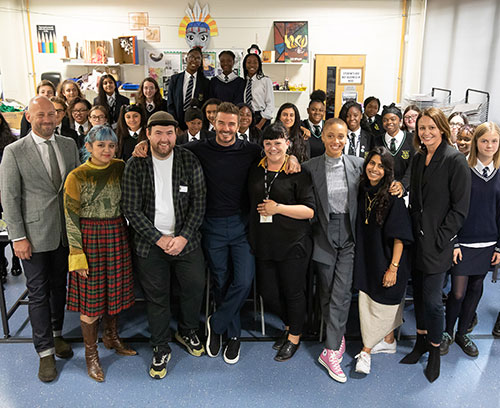 The British Fashion Council (BFC) launched its fashion studio apprenticeship alongwith BFC Chief Executive Caroline Rush, BFC Ambassadorial President David Beckham and BFC Ambassador for Positive Fashion Adwoa Aboah.
The British Fashion Council (BFC) launched its fashion studio apprenticeship alongwith BFC Chief Executive Caroline Rush, BFC Ambassadorial President David Beckham and BFC Ambassador for Positive Fashion Adwoa Aboah.
The Fashion Studio Apprenticeship is part of the BFC’s education department which gives young people a clear understanding of how to train for a plethora of industry roles within the creative industries.
Designed by a group of fashion employers, with the BFC, the apprenticeship starts at the studio and features the entire creation of a collection. The Fashion Studio Assistant is a key position in the designer industry, working with the team that creates a collection. For the first six months, the apprentice will complete a foundation which will include core elements of the job role such as critical path management and health & safety measure. This will lead to 12 months in a more focused area of the business, with the apprentice choosing to specialise in one of three pathways:
• Product Development and Production
• Sales and Operations
• Fashion Marketing and Communications
Following on from the 18-month training the apprentice will undertake an Independent End-Point Assessment that has been derived by industry experts in this field. The assessment will be taken in 2 steps:
• Work Based Project (Including Presentation and Discussion)
• Practical Test The grades for both elements will be combined to confirm the overall achievement of Fail, Pass or Distinction.
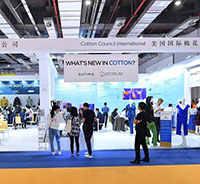 Cotton USA showcased its latest innovations in smart fashion at its booths in both Intertextile Shanghai Apparel Fabrics and Yarn Expo.
Cotton USA showcased its latest innovations in smart fashion at its booths in both Intertextile Shanghai Apparel Fabrics and Yarn Expo.
At both these shows, Cotton USA™ highlighted U.S. cotton’s sustainability, quality, transparency and premium value, as well as the findings of current market and consumer studies and its ongoing Sourcing Programs that match U.S. cotton buyers and suppliers throughout the supply chain.
Visitors to the booths also learned about how becoming a Cotton USA™ licensee will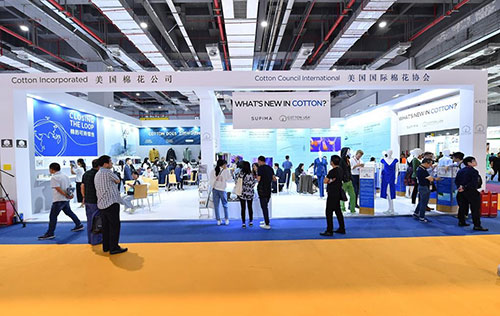 benefit their businesses. Quantitative consumer research proves that the Cotton USA™ Mark is of high value to consumers and can drive both preference and higher prices. In addition, Cotton USA highlighted six licensees at the booth–Color Denim, Huafu, Laws Group, Ningbo Guangyuan, SCHIESSER and Zibo Lanyan–showcasing high quality knitted and woven fabrics and garments.
benefit their businesses. Quantitative consumer research proves that the Cotton USA™ Mark is of high value to consumers and can drive both preference and higher prices. In addition, Cotton USA highlighted six licensees at the booth–Color Denim, Huafu, Laws Group, Ningbo Guangyuan, SCHIESSER and Zibo Lanyan–showcasing high quality knitted and woven fabrics and garments.
This year’s the Intertextile Shanghai Apparel Fabrics show had more than 4,400 exhibitors from 33 countries to feature a full range of textile products, and it attracted nearly 89,662 visitors from over 120 countries & regions to the three-day-show.
"The autumn edition of CHIC Shanghai from 25 to 27 September 2019 ended on a successful note. The exhibition recorded 698 exhibitors and 718 brands from 10 countries and 54,202 trade visitors. The exhibitors displayed their new collections on 62,000 square meters at the National Exhibition & Convention Center. CHIC is owned by Beijing Fashion Expo Co and China World Exhibitions, supported by the China National Garment Association, the Sub-Council of the Textile Industry (CCPIT) and the China World Trade Center."
The autumn edition of CHIC Shanghai from 25 to 27 September 2019 ended on a successful note. The exhibition recorded 698 exhibitors and 718 brands from 10 countries and 54,202 trade visitors. The exhibitors displayed their new collections on 62,000 square meters at the National Exhibition & Convention Center. CHIC is owned by Beijing Fashion Expo Co and China World Exhibitions, supported by the China National Garment Association, the Sub-Council of the Textile Industry (CCPIT) and the China World Trade Center.
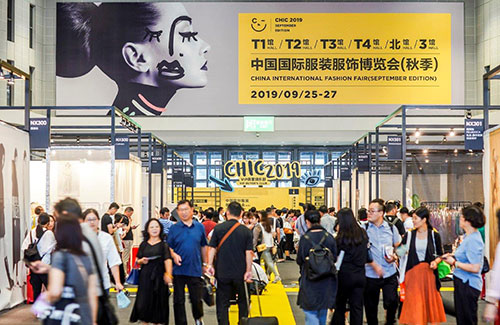
Ten clearly structured trade fair segments showcased the entire spectrum of fashion and lifestyle at the CHIC exhibition. These segments included New Look (Womenswear), Impulses (Designer), Urban View (Menswear), Chic Tailoring (Bespoke), Heritage (Leather and Fur), Chic Kidz, Chic Young Blood (Young Up-And-Coming Streetwear Labels), Secret Stars (Accessories), Bags & Shoes and Future Link (Innovative Developments For The Fashion Industry).
Focus on bespoke fashion
The New Look segment featured around 80 exhibitors who were mainly womens wear brands. The segment featured renowned exhibitors such as Jore Baudry.
Menswear featured prominently in the Chic Tailoring segment which showcased classic men's fashion, smart casuals with a growing denim component and bespoke collections. Solosali, one of the most popular Bespoke labels in China, received a great deal of attention in this segment
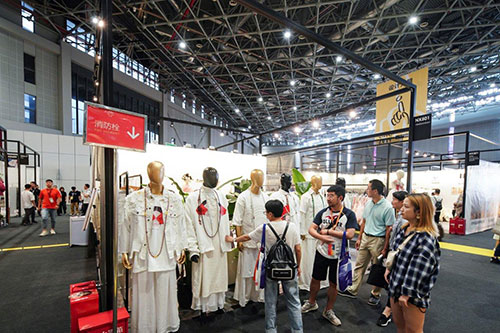
Launch of new label at Impulses
Impulses, the design department of CHIC, showcased designers such as Feng Sansan who presented his current collections for women, men and children with traditional Chinese elements. Designer Maggie Ma used the platform to launch her label Maggie Ma which is aimed at the younger target group. Further highlights for the visitors of Impulses were MAO MART homme, exclusive designer collection for women and Wei Jianfei, winner of the CHIC Market Potential Award.
In the Fashion Journey international section, the Korean show-in show Preview in China with 38 brands organised by the Korean Federation of Textile Industries (KOFOTI) presented their satisfaction with the professionalism of the CHIC exhibition platform.
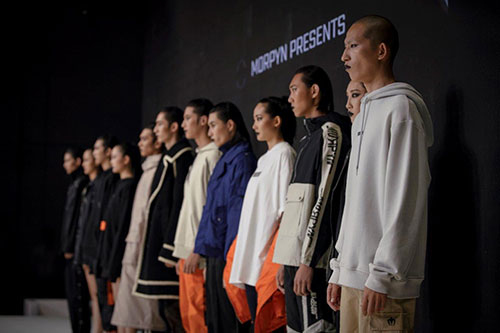
Positive response for leather and fur collections
The leather and fur collections of the ten participants in the Hong Kong Fur Association Pavilion met with a positive response from agents and wholesalers from all over China, even distributors of luxury brands were interested in future collaborations.
Spotlight on Poland
The Polish brands Kids on the Moon and booso used CHIC KIDZ as an entry point into the Chinese consumer market, as did Mimozah Kids from Canada. Mishka Matreshka from Laboratory in Russia also took the first step to China as part of CHIC and received very positive feedback from potential business partners with the manga style of their shirts.
In the area of CHIC Bags & Shoes, Glamoursy from Poland presented an exclusive shoe collection and so did the young shoe and bag label Inyati from Germany.
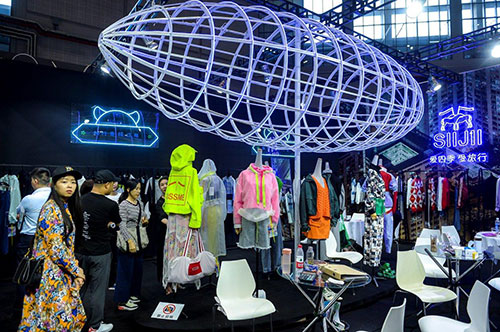
Industry topics at Chic Talk
The Chic Talk which deliberated on topics such as ‘E-Marketing in Social Networks’, ‘Responsible Development Conference and Integration of Industry and Banks in the Chinese Textile and Apparel Industry’, ‘Digital Traffic, Reshaping Retail - Omni Channel Digital Innovation Forum’, WGSN's Trend Preview The theme "A / W 20/21 Women's Wear Forecast & Buyers" and the opening ceremony of the Lining Cup, was well attended by visitors and exhibitors alike.
"This year, the International Sourcing Expo Australia will welcome the Jute Product Development and Export Promotion Council (JPDEPC) and around 10 of their member organisations who will showcase the benefits of jute to the Australian market. The expo, co-located with Footwear and Leather Show Australia and China Clothing Accessories Textiles Expo, is Australia’s premier international sourcing show for apparel, textiles, fashion accessories, footwear and leather products."
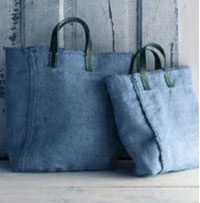 This year, the International Sourcing Expo Australia will welcome the Jute Product Development and Export Promotion Council (JPDEPC) and around 10 of their member organisations who will showcase the benefits of jute to the Australian market. The expo, co-located with Footwear and Leather Show Australia and China Clothing Accessories Textiles Expo, is Australia’s premier international sourcing show for apparel, textiles, fashion accessories, footwear and leather products. Into its tenth year, the three-day trade only event will open at the Melbourne Convention & Exhibition Centre on November 12, 2019 and will be restricted to bonafide trade professionals.
This year, the International Sourcing Expo Australia will welcome the Jute Product Development and Export Promotion Council (JPDEPC) and around 10 of their member organisations who will showcase the benefits of jute to the Australian market. The expo, co-located with Footwear and Leather Show Australia and China Clothing Accessories Textiles Expo, is Australia’s premier international sourcing show for apparel, textiles, fashion accessories, footwear and leather products. Into its tenth year, the three-day trade only event will open at the Melbourne Convention & Exhibition Centre on November 12, 2019 and will be restricted to bonafide trade professionals.
Over 4,000 visitors and 700 exhibitors to attend
Over 4,000 trade visitors will visit International Sourcing Expo and its combined events which will bring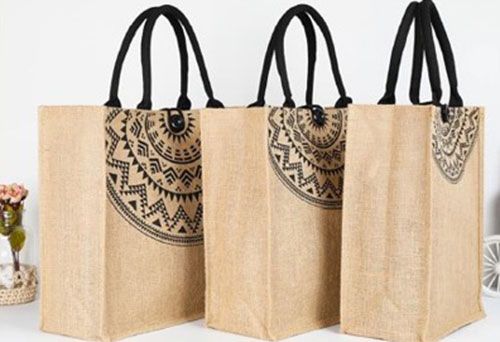 together 700 textile, apparel and footwear manufacturers and agents from 16 countries at the Melbourne Convention & Exhibition Centre from November 12-14 2019.
together 700 textile, apparel and footwear manufacturers and agents from 16 countries at the Melbourne Convention & Exhibition Centre from November 12-14 2019.
The trade-only event will showcase the product and service offerings of exhibitors drawn from China, India, Bangladesh, Pakistan, Hong Kong, Fiji, Indonesia, Vietnam, South Africa, Taiwan, Turkey, Australia, South Korea, Malaysia, Singapore, USA, Serbia and Nepal.
Organiser IEC Group believes this show will benefit from JPDEPC’s participation. Created in 2010 with the principal purpose of driving forward initiatives for the sustainable growth of jute exports from India, the council is managed by a 14-member committee of administration. Currently, the council has about 225 registered members covering various segments of manufacturing and trading of jute products.
Jute pavilion to feature latest trends and styles
The Jute Pavilion will feature renowned exporters attending the International Sourcing Expo Australia in Melbourne aiming to test the Australian market. Australian buyers will get an opportunity to meet manufacturers and exporters of jute lifestyle products and plan future imports and marketing strategies. The Jute Pavilion boasts of latest trends and styles, and buyers can expect to see colourful shopping bags, beach bags, fashion carriers, footwear and promotional totes.
Lenzing has hit a new milestone with Refibra technology. The Tencel-branded lyocell fibers can feature up to 30 per cent of pulp made from upcycled cotton scraps collected from garment manufacturing processes.
Lenzing launched the Refibra brand in February 2017. It is based on the group’s Tencel fiber, with the addition of cotton scraps and wood. The fibers, part of the Tencel lyocell fibers of low fibrillation properties, have enhanced breathability and are especially well suited to knitted applications. Refibra fibers are produced using Lenzing’s well established Tencel production process. Lenzing’s new fiber Refibra is based upon a circular economy pattern. Refibra’s new special collaboration collection includes different indigo fabrics and jerseys as well as denims employing different mixes of Refibra with other recycled or sustainable fibers. Many companies offer their own interpretation of Refibra fiber for jeans and casual wear.
Advances like these are important as climate change and an increasingly conscientious customer base pays more attention to the supply chain. There is an ongoing shift in consumer demand. The new consumers think more critically. They want to know where the product is coming from and they ask for transparency. Ethical consumerism is just at its beginning.
Apparel makers in Bangladesh have raised concerns over the new platform Nirapon. They say, it creates confusion about safety standards and adds new cost burdens in the name of monitoring and training. They feel Nirapon’s training module is the same as that of Alliance.
Nirapon was formed this year by 23 brands and retailers, including Walmart. Most are signatories of Alliance that folded its operations last December. Among other things, Nirapon will identify service providers capable of supporting regular supplier monitoring, remediation, capacity building and training. Suppliers have to work directly with service providers under the supervision of Nirapon. Alliance inspected fire, electrical and structural integrity of some 700 garment factories and remediated flaws in the last five years after the Rana Plaza collapse.
After the departure of Alliance, factories have been conducting in-house training on health and safety and maintaining safety standards prescribed by Alliance. So, apparel makers say, fulfilling the old requirements on the compliance issue in a new format is a waste of time and labor. After investing huge amounts of money in the industry to ensure workplace safety during the last five years, manufacturers are unwilling to bear a new cost burden. What they have asked for instead is reducing the scope of maintenance audits, which will result in a substantial reduction in fees.
Mukesh Trends Lifestyle is filing for an IPO. The IPO issue size will be between Rs 70 to Rs 90 crores. The company is seeking an issue of up to 10 crore equity shares with a face value of Rs 10 each.
Mukesh Trends Lifestyle, based in Ahmedabad, is engaged in fabric processing. It has business operations in nine states and one union territory. With rising demand from China, Turkey and Brazil, the company intends to set up a new manufacturing unit to process knitted denim fabrics. Its exports grew 367 per cent from 2016-17 to 2018-19.
The company’s primary business is of fabric manufacturing and processing, including pre treatment, dyeing, printing and finishing of grey fabric to produce finished fabrics in the form of knitted and woven fabrics. It specialises in processing of a wide range of fabrics like 100 per cent cotton, polyester, nylon, acrylic, linen, viscose, vortex viscose, cotton elastane, cellulosic fibers and blended fabric. The company procures grey fabric, dyes and chemicals from the market to process and print fabrics for retailers, brands, garment manufacturers, brands and retail vendors, traders, dealers and distributors. Its manufactured fabrics are specially suitable for suiting, shirting, men’s wear, women’s wear, kids wear, baby clothing, nightwear and sportswear.












